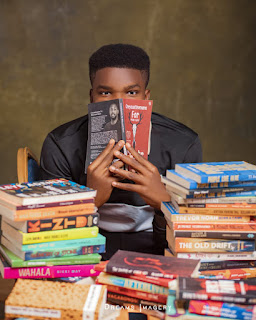The Problem sometimes is not Absence but Visibility —an Interview with Uchenna Emelife
When we talk about literature and the arts, there are those whose journeys inspire achievements.
The authenticity of things can, most times, be traced to how they began. While we love those "I-can't-believe-this" moments, we are also aware that building something worthwhile takes a lot of metaphorical and literal time —even the love for literature.
My interview with Uchenna began by attempting to pin down a pivotal moment when his love for the arts was fueled. Perhaps, as a student of Literature, he'd walked into a class in freshman year and felt captivated by a lecture, I guessed. It happens, however, that his love for literature and the arts predates his university studies.
"The first time I found a passion for the arts was after reading Purple Hibiscus by Chimamanda Ngozi Adichie," he replied softly. "I think I was 13 or 14 at the time, and it was a recommended text for Literature in secondary school. Something about Purple Hibiscus changed me in a way no other book had. It made me discover the power of stories, especially the kind with characters that looked and behaved like me. I knew right after that this ability to tell a profound story was something I needed to do. I may not have had it all figured out, but the interest registered in me and it has since stayed."
That's relatable to a lot of us. We've read a novel, listened to a song or an audio, watched the process of painting an artwork or mosaic, and gotten a hint, "That's exactly what I want to do with my life!"
Years later, Uchenna would become many things in the arts. "From bookseller to arts curator, your roles are diverse. How do you manage to strike a balance between your love for literature and the administrative demands of Book'O’Clock?" I asked.
"They complement and, at the same time, do not," Uchenna confessed. "Administrative duties can be quite overwhelming that they begin to sap away the joys of engaging with literature. As an arts curator, there are ironically lots of non-arts activities that make up the work we do: sustaining a mail thread, ensuring that the project you're curating is well-publicized, securing funding for it— all of that can be quite a lot. And as you rightly noted, I'm also a bookseller. Irrespective of the commodity being something as exciting as books, it is still a business and requires technicalities to sustain.
"Sometimes, I just want to be able to read a book and love it like everyone else without thinking about its marketability or the projects I can design around it or the author. Sometimes I want to stay as the arts enthusiast who neither produces nor manages— haha.
"However, what keeps me going is the importance of the work I do. The spaces and platforms my efforts contribute to making all of the stress worth it."
I asked Uchenna about the Sokoto Book and Arts Festival. Were there any scenes, statements, faces, or aspects of the festival that have remained in his head ever since?
"The story of the first edition of the Sokoto Book and Arts Festival will remain evergreen in my mind. The reason was how the idea came," he explained.
"Sokoto Book and Arts Festival— or just SOBAFest— is the brainchild of three platforms: Book O'Clock, Caliphate Arts & Literary Forum, and Poetry Club UDUS. Before jointly coming up with SOBAFest, we were individually planning arts events around the same time and for the same audience in Sokoto. It was a surprise to learn of each other's plans and how they complemented each other. So, we felt that rather than having three separate events, we could have one grand event that caters to the scopes of our projects. That event became what the world witnessed as SOBAFest."
The most memorable thing about curating SOBAFest, Uchenna further said, was how they pulled off a fantastic event with such a tiny budget. "With no major funds or grants, but our sheer will and determination, we managed to put up an event that earned us features and mentions in spaces we could only dream of. That alone showed us just how much we can do if we put our minds to it. As cliché as it sounds, indeed if you can dream it, you can make it."
Moving on to Uchenna's nomination as Mediapreneur of the Year and being recognized as one of the top 20 influential graduates, his accomplishments have been remarkable and reflected a deeply fascinating dedication to his craftsmanship. A thing given attention would grow exponentially, but imagine an ounce of attention given to more than one project. "How do you stay motivated to achieve such high standards in your work, especially as a student of Literature who would have dozens of literary texts to gobble up?" I asked.
He may have been used to questions like this. "I stay motivated because I have seen others wear more hats and do even better." An epic response indeed. "I follow such people's stories and try to unravel what they are doing right that I can model after. Thanks to interviews and conversations that they grant, it is made easy to learn about their productivity process. African creatives like Echezonachukwu Nduka, Ukamaka Olisakwe, Bibi Ukonu, Lola Shoneyin, and Jennifer Chinenye Emelife, who wear multiple hats and fit well into each, keep me going. Whenever I feel less motivated, I remember them and I'm re-energized."
Added to that, the success stories of his work keep his hands engaged even when he's tired or, in some cases, disappointed. "I remember communities and individuals I have been able to reach through my work, and it keeps me going. Because if I stop, who have I left it for?" he posed.
Attending the Sharjah International Booksellers Conference and being shortlisted for the Ashoka Africa Changemaker Prize are some of Uchenna's incredible achievements. Responding to the question of how these experiences shaped his perspective on the literary world and his role within it, he replied, "Attending the Sharjah International Booksellers Conference in 2022 was such an eye-opener. The conference was comprised of booksellers from across the world, and for a budding bookseller like myself, it came with a lot of exposure to the trade. I had the privilege of listening to more experienced industry players and interacting with them. That completely changed my approach towards the book business, and every upgrade in the trade I've witnessed is a testimony to the conference."
"Making it to the shortlist of the Ashoka Africa Changemaker was a reminder of the importance of the work that I do. 'That people are watching and that they value it, that is validation,' he commented. 'It may not be what I work for, but at times when it comes in the form of awards, nominations, and press features, I'm motivated to keep on. That my work matters!'
'Your dedication to spotlighting lesser-known artistic spaces is worth applauding. Can you share a project that you are particularly proud of, where you felt you made a substantial impact in giving voice to those spaces?' I asked.
'Yes. The Sokoto Book and Arts Festival,' Uche answered. 'In the last edition of the festival I curated, I shared a story in my opening remarks. In one of our pre-festival official outings, a member of our team, Majeed Bn Saleh, who was a runner-up in the poetry slam of the earlier edition, unsolicitedly shared how SOBAFest gave him a home at a time he thought he was alone and how his art has since flourished. Stories like these are my greatest successes and emphasize my belief that the problem sometimes is not absence but visibility, which is evidence of the need for the kind of platforms we provide.'
A little away from frontier arts and literature, I discovered, shortly into our conversation, that Uchenna is, in fact, a lover of American sitcoms, as he told me. First, I must confess, I didn't know what American sitcoms were, but thanks to Google, I was schooled! 'Amidst your busy schedule, you mentioned being a fan of American sitcoms. What's your all-time favorite sitcom, and do you find any interesting connections between these shows and your work in the literary field?' I inquired.
'I do not have a single all-time favorite, that'd be such a difficult choice to make,' he chuckled lightly. 'I have a list instead,' he added. 'The Big Bang Theory, Friends, How I Met Your Mother, Brooklyn 99, and 2 Broke Girls are a few on the list. Do they have a connection to my literary self? I don't think so. I enjoy good humor. It is witty and funny. A blend I continue to aspire to.'
'Wit' and 'fun' particularly piqued my next interest. 'With a focus on engaging storytellers for social change, could you share an interview or conversation that had a profound impact on both you and your readers, sparking meaningful discussions?'
'If I had to select just one of my conversations that sparked further conversations, it would be my dialogue with Bryan Okwesili. Titled 'Humanising The Queer Experience', it explored Bryan's representation of queerness in his stories and how literature can help in humanizing queerness.'
You can read Uchenna's conversation with Bryan here.
Getting towards the end of our conversation, I had to ask him one burning question. 'Your passion for literature is evident, but I'm curious —what other hobbies or interests do you have that might surprise us?'
In honesty, Uchenna couldn't think of anything else he enjoys beyond reading and watching sitcoms. 'But if we are speaking in a general sense, I can add 'eating shawarma' as a habit,' he laughed.
A little back to literature and arts before we signed out, 'As someone who champions the power of stories, can you tell us about a book that had a profound impact on your perspective or that you often recommend to others?' I asked.
Of course, it was Purple Hibiscus.
Finally, having rounded off undergraduate studies, I asked if Uchenna had any in-the-nearest-future plans he would like to share with us. 'What's next? Are there any perks?'
'Now, I'm breathing and living every day to the fullest. Fingers crossed for the future,' he smiled.
As Uchenna stands on the threshold of the future, he embraces each day with open arms, ready to seize new opportunities and make meaningful contributions to the world of literature and the arts.










One of the most details Interviews I've read so far.
ReplyDeleteWorth the wait, Shalom.
👏
Indeed, Uchenna is a genius
ReplyDeleteBeautiful 👏
ReplyDeleteGlad to read about Nigeria 👍
ReplyDeleteI'm reading this from the kitchen and smiling 😂
ReplyDeleteyes
ReplyDeleteGood work
You're not the only one who has had to Google who a bookseller is 😄
ReplyDeleteI had thought it was a a small man wearing a cowboy hat, hoarding in Heathrow airport 😆
ReplyDeleteAm I the only one who feels kashim should have asked if he was single? 😶
ReplyDeleteThat's part of interview too, isn't it?
Is Sokotoo the capital of Nigeria? just like New Delhi?
ReplyDeleteis that what they teach you in India?
Delete